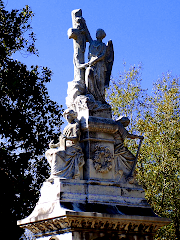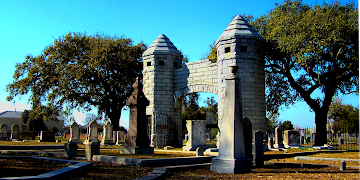I might get around to updating this post with more description and backstory later, or I might not. Either way, here are some pictures.
Yes, I realize I tagged this post with the label 'Graveyard' when it's actually a cemetery.
And yes, I do know the difference.
I maintain that the existence of a church is debatable, and I didn't see any compelling reason to create a separate label.
Get over it.
I stopped on my way home from work to take some photos in the nearby Magnolia Cemetery
-=[ Note: ]=-
Yes, I realize I tagged this post with the label 'Graveyard' when it's actually a cemetery.
And yes, I do know the difference.
I maintain that the existence of a church is debatable, and I didn't see any compelling reason to create a separate label.
Get over it.
I stopped on my way home from work to take some photos in the nearby Magnolia Cemetery
Magnolia Cemetery
Link goes to sciway.net website. (page will open in new tab/window)
.It wasn't really the best time of day for most of the photos, Shadows have a habit of falling wherever the sun puts them. And even if I were using a more professional-grade camera than this Kodak, you still have to contend with the lack of talent on the part of the photographer. Even the best equipment and conditions can't overcome that limitation.
Heck, I don't even remember how to use half the settings on the consumer-grade Kodak most of the time, so I can't really fault the time-of-day.
And the quality of the camera probably works in my favor -- Higher-end cameras tend to be less forgiving, and would likely make my ineptitude easier to spot (or at least, harder to ignore). Besides, I like this little Kodak.
But here be the pictures, in any case.
The Bethany and St. Lawrence Cemeteries adjoin Magnolia, and I couldn't help wandering into those also so the photos are really from all three.
Magnolia Cemetery was founded in 1849 on the Western bank of the
Cooper River
Cooper River
View from the Eastern bank
at the Mepkin Abbey garden
, a short distance Northward from what is now called the 'historic district' of Charleston SC.at the Mepkin Abbey garden

It is still an active cemetery containing ~35,000 graves, tombs, and mausoleums, covering ~130 acres with ~50 acres set aside for new graves.
Fourteen of the signatories to the original Ordinance of Secession are interred here, among other notable historic figures such as former governors, senators, cabinet members, etc.
It is (unsurprisingly, given the location) the final resting spot of over 2,000 soldiers from the War for Southern Independence, including at least five Confederate
Generals
James Conner, Micah Jenkins, Arthur Manigault, Roswell Ripley, and C.H. Stevens
.Horace L. Hunley, the engineer who designed the earliest submarines used in wartime, was buried here on Nov 8, 1863, with full military honors.
Fittingly, Lieutenant George E. Dixon, the Commander of the submarine CSS H.L. Hunley, was buried here in 2004 with the seven other
crewmembers
Arnold Becker, Cpl C. F. Carlsen, Frank Collins, C. Lumpkin, Augustus Miller, Joseph F. Ridgaway, and James A. Wicks.
who died after sinking the Union sloop USS Housatonic, joining Horace L. Hunley himself and all the members of the boat's earlier crews.Graves of the famous and the infamous infamous can be found here. Statesmen, soldiers, authors, poets, and artists share the grounds with pirates, bootleggers, gangsters, and other assorted scoundrels including the occasional whorehouse Madame.
Yes, you read that correctly. I said "whorehouse Madame". The history of the so-called "holy city" of Charleston is not without its share of unholiness. People are still people, regardless of the decade or century. Were it not true, you wouldn't likely be here to read this.
But I'm getting off-track... My train-of thought is de-railing.
There are entire books written about the subject, if that sort of thing interests you.
Yes, you read that correctly. I said "whorehouse Madame". The history of the so-called "holy city" of Charleston is not without its share of unholiness. People are still people, regardless of the decade or century. Were it not true, you wouldn't likely be here to read this.
But I'm getting off-track... My train-of thought is de-railing.
There are entire books written about the subject, if that sort of thing interests you.
I intend to go back sometime when neither of my legs are broken, so I can walk around more and get some better photos.
Magnolia Cemetery is listed in the National Register
Magnolia Cemetery
Link goes to the Historical Marker Database website (hmdb.org) (page will open in new tab/window)
of Historic Places. 










No comments:
Post a Comment